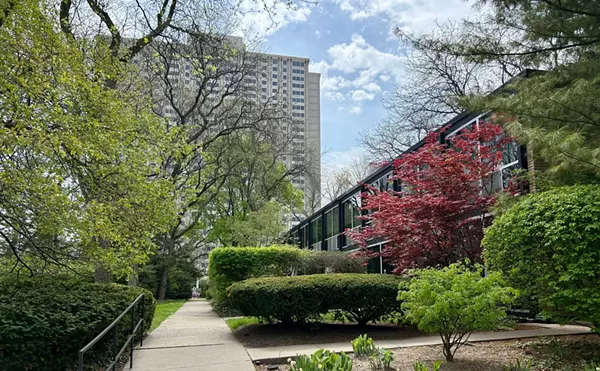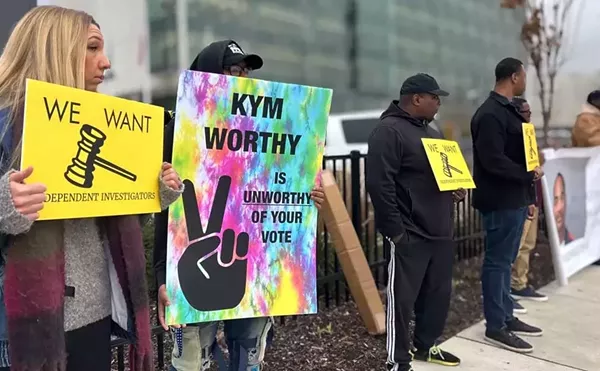
Audio By Carbonatix
[
{
"name": "GPT - Leaderboard - Inline - Content",
"component": "35519556",
"insertPoint": "5th",
"startingPoint": "3",
"requiredCountToDisplay": "3",
"maxInsertions": 100,
"adList": [
{
"adPreset": "LeaderboardInline"
}
]
}
]
The trial for a Palestinian American activist and women's rights advocate who's accused of lying on her U.S. naturalization application about being arrested and convicted in Israel nearly a half-century ago began Tuesday morning.
To say the circumstances surrounding the case appear problematic would be an understatement.
For what supporters say is nothing but an attempt to disrupt the Palestinian human rights activist community, Rasmea Odeh, 67, faces up to 10 years in prison, revocation of her citizenship, and possibly deportation. Odeh was arrested on charges of unlawful procurement of naturalization in October of 2013 and indicted the same day.
The issue dates back to 1969, when the Israeli military arrested Odeh and 500 others, accusing them of terrorism.
There's one issue, however, Odeh's supporters say: Following her arrest, Odeh was brutally tortured and raped while in prison for weeks, which led to her offering a confession for that she participated in two bombings — crimes she now says she didn't commit. Odeh then spent 10 years in Israeli prisons. Odeh, federal prosecutors say in a 16-page indictment, was a part of the Popular Front for the Liberation of Palestine (PFLP), a Marxist-Lenin group who "used terrorism as a means to win attention to its cause."
As the Arab American News reports, U.S. District Judge Gershwin Drain wrote in his ruling that torture and rape are "antithetical to the concepts of fairness due process and basic human rights. He added that the court accepts Odeh's claims as "credible."
And then he ruled the evidence could not be included in the trial.
"[The court] is not unaffected by the inhumane circumstances of her detention in the West Bank," the ruling reads. However, the judge added that he wants the proceedings to focus on the charges leveled against Odeh here, not the circumstances of her trial in Israel.
In March 1979, Odeh was released, and later testified in before a United Nations panel in Geneva on what she endured. A summary of parts of her testimony can be found at The Hill.
[A]s a 21-year-old university student, she was arrested from her home in Ramallah in the middle of the night by Israeli soldiers who "beat me without asking me a single question." She was brought to an Israeli jail in Jerusalem where "they beat me with sticks, plastic sticks, and with a metal bar. They beat me on the head and I fainted as a result of these beatings. They woke me up several times by throwing cold water in my face and then started all over again."
In addition to this physical torture, Odeh also faced sexual torture. Her father, a U.S. citizen, was also arrested and beaten, "and once they brought in my father and tried to force him under blows to take off his clothes and have sexual relations with me." Later, interrogators "tore my clothes off me while my hands were still tied behind my back. They threw me to the ground completely naked and the room was full of a dozen or so interrogators and soldiers who looked at me and laughed sarcastically as if they were looking at a comedy or a film. Obviously they started touching my body." In her father’s presence, interrogators threatened to "violate me" and "tried to introduce a stick to break my maidenhead [hymen]." Shackled naked from the ceiling, interrogators "tied my legs, which were spread-eagled, and they started to beat me with their hands and also with cudgels."
In other words, even though the judge ruled her evidence was "credible," that her confession was seemingly coerced, it was not admissible or relevant to the case. Now, the Arab American News notes, "the prosecution only has to prove that Odeh knowingly lied on her citizenship, regardless of her motives."
Deutsch had filed a motion to exclude evidence from Odeh's trial in Israel because the judicial practices of the military court that tried her violate the U.S. Constitution.
The judge denied the motion, allowing the introduction of evidence from Odeh's 1969 trial in accordance with the Mutual Legal Assistance Treaty between the United States and Israel.
Drain's only decision in favor of Odeh was his ruling to bar the prosecution from mentioning terrorism in front of the jury.
With jury selection expected to wrap this afternoon, the three-day trial will begin tomorrow. Over 100 supporters of Odeh from across the country are expected to be seated in the courtroom, and dozens more from across the Midwest are expected to arrive in the coming days.
Odeh has been involved in the Arab-American community in Chicago since arriving in the U.S. in 1994. She currently serves as associate director of the Arab American Action Network, a nonprofit that provides services to the Arab-American community in Chicago.
Jess Sundin, of the Minneapolis-based Committee to Stop FBI Repression, says, "For us, Rasmea is an incredibly important leader in the community in Chicago where she comes from."
"She has been really building important work, especially for Arab immigrant women in that community," Sundin says. "And we need her here."
Sundin says Odeh's defense team sought to include experts who could talk about the sort of trauma she experienced in prison, and how that could've impacted her interpretation of the questions on her application. The judge denied the defense's motion to include the expert.
"Fundamentally, this is a case about prosectuting her for the crimes that were committed against her by Israel," says Sundin. "And it's a part of a longstanding approach the government has taken against Palestinians.






